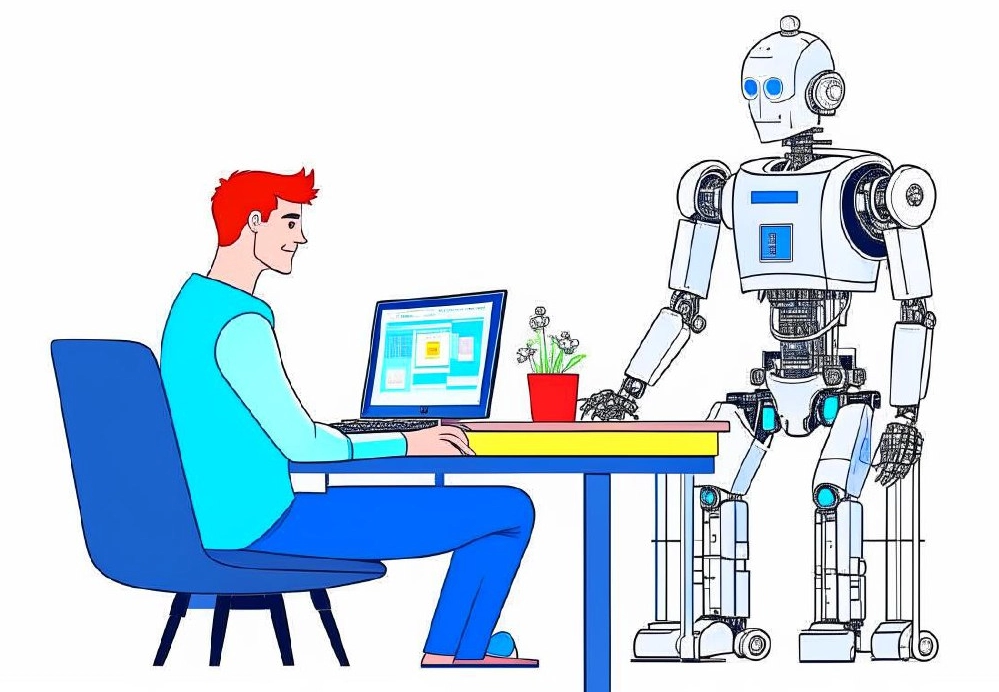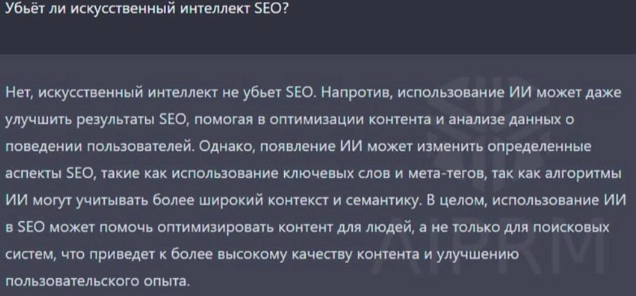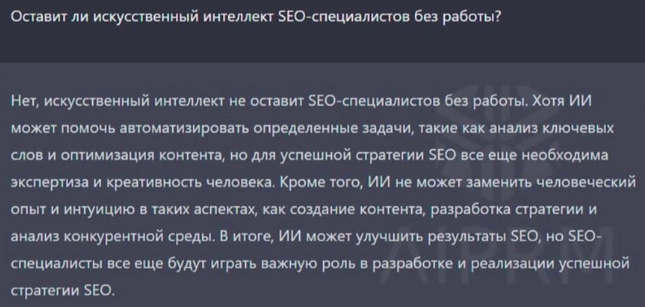Artificial intelligence and SEO: enemies or allies

The article content
- What are the consequences of the appearance of a new technology on the it market?
- Can artificial intelligence replace classical search?
- Artificial intelligence — this is a friend
- Bing, you.com and bard: what are these tools from google?
- The whole secret — at the core of organic queries
- Chatgpt features
- Summing up
Artificial intelligence, neural networks — This is something that actively enters the life of a modern person. Technology is constantly evolving, expanding, affecting new areas. In many ways, it becomes a reliable assistant in solving everyday routine tasks. But for many specialists who work in the field of Internet technologies, a completely natural question arises: artificial intelligence — is it an ally or an enemy who can deprive you of earnings? Now let's talk directly about artificial intelligence and its impact on the work of SEO specialists.
If we analyze the entire history of the formation of SEO, starting from the moment of appearance search engines and until today, then specialists from this field constantly had competitors. Initially, these are the first social networks, then — voice search and other smart assistants. Subsequently, the focus was on channels in instant messengers. Behind them, the metaverse came to the market of Internet technologies. Therefore, artificial intelligence can be attributed to the next step in the development of technologies, which also has and will have an impact on SEO as such in the future.
Now let's take a closer look at how the emergence of a new technology on the market affects this area of the Internet market. Let's talk about whether artificial intelligence will replace search. Let's get acquainted with the capabilities of the ChatGPT neural network. We will show you how to organize the most functional and diverse work on the network without risk.
What are the consequences of the appearance of a new technology on the IT market?
The IT technology market has been actively developing for decades and this trend is not declining. But no matter what technology appears, 3 things are sure to happen every time:
- SEO specialists are actively raising the topic. Case studies are published, posts that are designed to show their expertise in new technology.
- There is a lot of speculation that new technology is sure to kill SEO. And this happens every time, regardless of the solution that appears. Only the names and dates change.
- SEO still continues to work, generates conversions, traffic. When the storm of emotions from the emergence of a new technology subsides somewhat, it becomes clear to everyone that SEO — the most prioritized marketing channel.
This has happened many, many times before. But in the last couple of years, the resonance of the overblown problem has gained even greater proportions. And the reason here — emergence on the market of neural networks and other technologies related to artificial intelligence. But we are trying to convey a simple truth: organic search is immortal. Whatever technologies appear on the market, its relevance will always be at a high level. And so it will be as long as users have questions, for answers to which they will turn to the Internet. And this means that both Internet marketers and SEO specialists will constantly be in demand in the market.
In order to convince you of the correctness of this opinion, we will consider in more detail a number of issues related to artificial intelligence and network search.
Can artificial intelligence replace classical search?
The hype about the emergence of artificial intelligence in the market and the fact that it is about to supplant both search engines and SEO specialists has been actively supported for several years. But we do not see any evidence for this in practice. Many who work in the field of Internet marketing and organic promotion have decided to make friends with the so-called "enemy". Specialists began to use neural networks and the same ChatGPT as another tool in their arsenal, simplifying their work, expanding functionality.
But what artificial intelligence about SEO and search engines in general? If we ask ChatGPT this question, we get the answer:

As you can see, everything here is quite logical and understandable. You just have to change, develop new methods. We must come to terms with the fact that the times when the search algorithm could be clearly deceived and get the desired position in the search results are already a thing of the past. That is, black hat SEO tools no longer work. Gradually, this technology is being transformed into classic digital marketing. When developing a strategy for promoting an Internet resource, it is necessary to comprehensively work out each project, form a portrait of the target audience, take into account its intentions and wishes, and think through several scenarios of user behavior. Also, you can not do without a detailed analysis of the state of the market, monitoring competitors.
Is it possible to trust the data of the work of a neural network? Will she be able to effectively handle each of these tasks, including complex strategizing, thereby leaving all his specialists out of work? Here is ChatGPT's answer to this question:

As you can see, even artificial intelligence itself says that without human creativity and expertise it will be impossible to get the desired result in promoting resources.
Artificial intelligence — this is a friend
Yes, neural networks will not deprive you of your job. But this can be done by another SEO specialist who will take artificial intelligence into service and use its tools in his daily work. Many who have not yet deeply understood AI technology demand the impossible from it. It should be understood that ChatGPT and other large language models are not able to extract information from databases. They have neither a knowledge graph nor an index. They don't store data the way a classic search engine does.
The basis of any neural network — machine learning. The AI uses word vectors to predict which words or sentences will come next. They build on the materials they were trained on, but do not store them. And artificial intelligence cannot physically monitor Internet sites. Its functionality does not include an analysis of current events, a link to primary sources. It does not follow trends and does not store all this information. For the most part, he just makes it up. And the more popular and promoted the topic will be discussed, the closer to reality will be the answers of artificial intelligence. And all because he has already studied well in this topic and knows which sentence will go next if there are a few words nearby. But if you touch on a topic unfamiliar to him, you will get spatial answers that cannot be relied upon.
It will be a long time before artificial intelligence learns how to answer questions about current events. To complete the training, he will need far more than one day and impressive resources. But in any case, the competence of the neural network in certain matters will always be one step behind reality.
Bing, You.com and Bard: what are these tools from Google?
Google has been quick to catch up with market trends by providing users with tools that will make it easier to work with both search engines and artificial intelligence. So, the same Bing — this is not a classic chatbot. It performs an organic search on the web for your query and returns all those pages that match it. Then he turns to artificial intelligence and asks for a brief summary of the material found.
What an ordinary person does with Bing using the tools available to him today, including neural networks, will not be able to do. The reason here is rather banal — exceeding limits on tokens. That is, a person physically does not have the material resources to solve such a problem. But the tools from Google have such an opportunity.
The whole secret — at the core of organic queries
Any search is based on verbs, namely — action. Bill Gates spoke about this more than 15 years ago. His thought boiled down to the fact that people who access the Internet have a need to do something. The search is designed to solve this problem. Here it is important to understand the main difference between search and television advertising, billboards: it works on the so-called "attraction" technology. That is, the user himself says what he wants and receives an answer to his request. At the same time, advertising uses "pressure" marketing to offer its products. From this we can conclude that the main task of every Internet marketer — provide users with what they need, and the search engine – give users answers to their questions.
In the case of simple answers, the situation is ambiguous: users often do not even need a website. So, if they send in a query about who the lead singer of Imagine Dragons is, they're just hoping to get a name. But from such requests, sites simply lose traffic. Therefore, all specialists in their work need to focus not so much on information as on targeted requests. Where the user would like to perform this or that action, for example, buy tickets for the next Imagine Dragons concert, chat with fans, read reviews of the latest album, etc. It is in this niche that the demand for organic search will remain consistently high and artificial intelligence will this niche — not a competitor.
ChatGPT features
Continuing the topic of artificial intelligence, as well as its capabilities, let us dwell in more detail on the functionality of the most famous neural network today — ChatGPT. Here are some highlights:
- Using ChatGPT you can write a formula in MySQl or Excel. But you cannot get the necessary knowledge to work with database management systems or spreadsheets using ChatGPT. Also, you will not be able to communicate with other people working with database theory. But the search engine is able to provide you with all this.
- Get answers to common questions in ChatGPT. But right away we want to draw your attention to the fact that the competence of the answers will be high only if the topic you raised is popular, old enough and there are no controversial points in it. But it is not necessary to talk about 100% reliability of the information received. This is due to gaps in machine learning: in order for the neural network to give the correct answer, this information should have been put into it earlier.
- Get a selection of bars or restaurants, hotels. But here are recommendations about which of these places will be the best, where this or that dish will be tastier, the neural network, alas, will not tell you. You can find such information through search engines by studying the relevant reviews from people who have visited these establishments.
- Content creation. This question is relevant not only for SEO specialists, but also for copywriters. Yes, ChatGPT knows how to answer questions, and quite successfully and competently in a certain popular niche. Moreover, artificial intelligence has really succeeded in manipulating text. In addition, he can be entrusted with such work as clustering and grouping key queries, generalizing content, writing complex expressions for a redirect, generating codes based on given data. ChatGPT will also be a good option for creating one-page business card sites, you can use it to make a pre-lander. But still, he will not be able to build a competent structure of the article, provide for breakdowns into subheadings, take into account the wishes of the customer for the material, style, etc. An article created by a neural network will rather resemble a Q&A block. That is, to work with full-fledged sites ChatGPT — not the best option. Here, a significant refinement of a specialist will be required.
Summing up
Summing up here, we can say that artificial intelligence in its work relies on huge amounts of data that it receives from various sources. And it is impossible to speak about their reliability. Lots of manual checks required. That is, it is clearly not worth creating content, looking for answers to questions in a narrow, little-voiced topic using a neural network. Yes, you can ask him a few questions, get answers, and then sit down and personally work through the information received. But this is by no means a replacement for SEO — it's just saving time collecting material.
You must understand that artificial intelligence — this is not a reflection, not extracting information from databases, and not even a banal citation of primary sources. The neural network will give you an answer based on the analysis of the probability of using the next word in the text. This is how proposals will be built. In addition, he will never be able to understand the real needs of users, which means he will not be able to prepare answers that satisfy them. If a person needs a fresh idea, insight, then only real people can provide them.
Yes, artificial intelligence will contribute to the work of SEO. As a result, new trends and forms of work will emerge. But this is not a cause for concern — this is just a guarantee that you, as a specialist, will always be in demand. But the truth is that you will have to constantly improve and be aware of the latest trends.
Another thing to keep in mind when working on the Internet is your own security and confidentiality of actions. Mobile proxies from the MobileProxy.Space service will help ensure this. For more details on features and pricing, you can read here. A significant advantage from their use of automated software for scraping, etc. Mobile proxies will reliably hide your IP-address, which means that you can easily maintain your anonymity on the network and will not become a victim of hacker attacks, etc. Issues that arise in the workflow are easily resolved by the technical support service, which works around the clock.